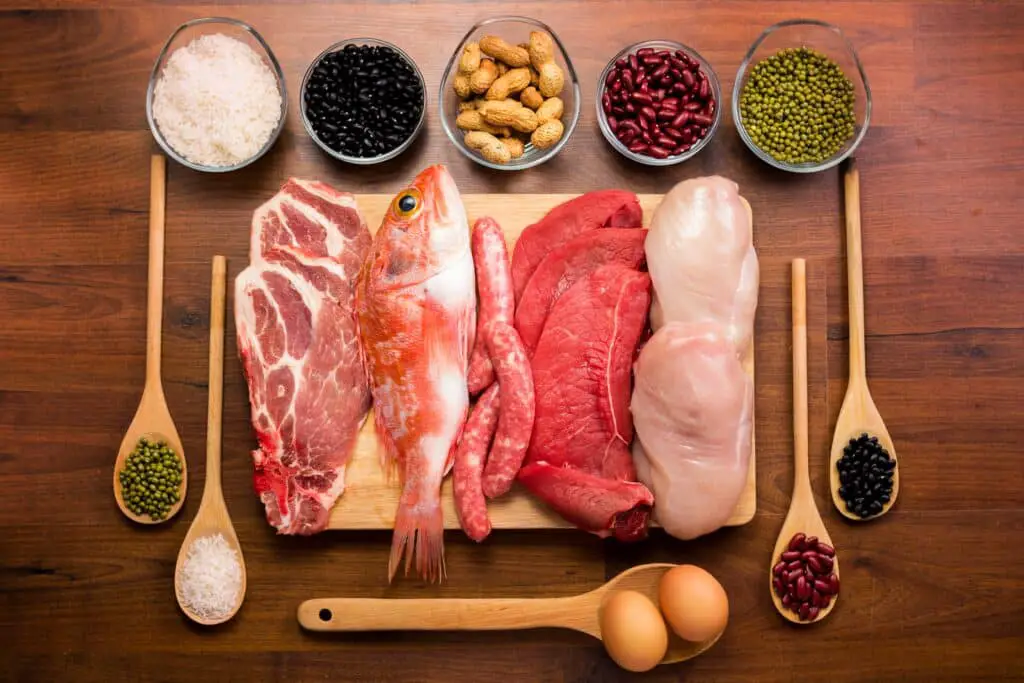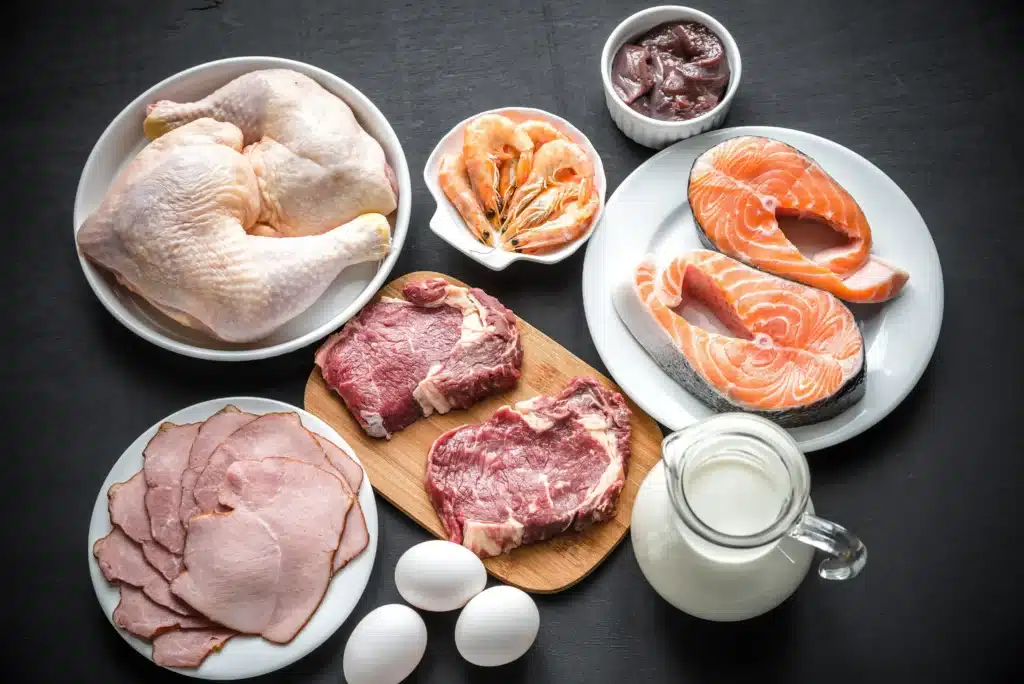Introduction
Is Meat Good For Weight Loss: The relationship between meat consumption and weight loss has long been a subject of debate and scrutiny within the realm of nutrition. For many, meat is a staple in their diets, providing a significant source of protein and essential nutrients. However, its impact on weight loss has been a topic of considerable interest due to concerns about its calorie content, fat content, and potential health effects. Meat, particularly lean varieties like poultry and certain cuts of beef, can indeed be part of a balanced weight loss diet. It is rich in protein, which plays a crucial role in maintaining muscle mass and promoting a feeling of fullness, thereby aiding in appetite control.
Additionally, protein requires more energy to digest compared to fats and carbohydrates, contributing to a slightly increased metabolic rate.However, the type and quantity of meat consumed, as well as overall dietary habits, are vital considerations. Some meats are higher in saturated fats, which can contribute to weight gain when consumed excessively. Moreover, processed meats, often laden with additives and preservatives, may have negative health implications when consumed in large amounts.
In this exploration of the relationship between meat and weight loss, we will delve into the various factors at play, including the type of meat, portion sizes, and dietary patterns, to provide a comprehensive understanding of how meat can fit into a weight loss strategy. By examining both the advantages and potential pitfalls, we aim to equip you with the knowledge needed to make informed dietary choices on your weight loss journey.

Is meat good for weight loss?
Meat can be a part of a healthy weight loss diet. The key is to eat lean meats with higher protein content and less saturated fat content. You may also want to stay away from processed meat.
Indeed, meat can play a role in a healthy weight loss diet when chosen and consumed wisely.
Protein Content: Lean meats, such as chicken breast, turkey, and lean cuts of beef or pork, are excellent sources of high-quality protein. Protein is essential for building and repairing tissues, and it also helps to maintain muscle mass. Additionally, protein can promote a feeling of fullness and satisfaction, which can help control appetite and reduce overall calorie intake.
Satiety: The satiating effect of protein-rich foods can be particularly beneficial for weight loss. When you feel full and satisfied, you’re less likely to overeat or snack on unhealthy foods.
Thermic Effect: Protein has a higher thermic effect compared to fats and carbohydrates, meaning it requires more energy to digest and metabolize. This can contribute to a slightly higher metabolic rate, helping with calorie expenditure.
Nutrient Density: Lean meats also provide essential nutrients like vitamins (e.g., B vitamins) and minerals (e.g., iron and zinc) that are important for overall health.
However, it’s essential to be mindful of a few factors:
Portion Control: While lean meats can be beneficial, portion control is crucial. Overeating any type of food, including lean meats, can lead to excess calorie intake, hindering weight loss goals.
Processed Meats: Processed meats like sausages, bacon, and some deli meats often contain high levels of sodium, saturated fats, and preservatives. It’s best to limit or avoid these options.
Balanced Diet: Weight loss is not just about individual foods but the overall balance of your diet. Incorporate a variety of foods, including fruits, vegetables, whole grains, and lean proteins, for a well-rounded and sustainable approach to weight loss.
Why is a meat diet best?
Meat is a rich source of vitamin K2, which has been shown to decrease calcification of arteries, a factor that plays a crucial role in the development of heart disease. Additionally, a 2019 review suggests that a high-protein diet can help lower LDL (often referred to as the “bad cholesterol”) levels.A meat-based diet can offer certain nutritional benefits, but it’s essential to consider the overall context and balance of one’s diet.
Here are a few reasons why some people advocate for a meat-inclusive diet:
Rich Source of Nutrients: Meat is a concentrated source of several essential nutrients, including high-quality protein, vitamins (such as B vitamins like B12 and niacin), and minerals (such as iron and zinc). These nutrients are vital for various bodily functions, including muscle growth, immune function, and energy production.
Vitamin K2: As you mentioned, meat, particularly certain types like beef and chicken liver, is a source of vitamin K2. Vitamin K2 has been associated with potential benefits for heart health, as it plays a role in calcium metabolism. It may help reduce the calcification of arteries, a process that can contribute to the development of heart disease.
Protein for LDL Cholesterol: Some studies suggest that a high-protein diet can help lower LDL cholesterol levels, often referred to as “bad cholesterol.” Protein can promote satiety and reduce overall calorie intake, which can indirectly contribute to weight management and improved cholesterol profiles.
However, it’s important to note that a diet focused solely on meat can have potential drawbacks:
Balanced Nutrition: A diet exclusively centered around meat may lack the diversity of nutrients found in a balanced diet. Fruits, vegetables, whole grains, and legumes provide essential fiber, antioxidants, and vitamins that are important for overall health.
Saturated Fat: Certain cuts of meat, especially red and processed meats, can be high in saturated fats, which, when consumed in excess, may increase the risk of heart disease and other health issues.
Environmental and Ethical Considerations: A meat-centric diet can have significant environmental and ethical implications, as it often requires large-scale animal farming, which can contribute to greenhouse gas emissions and animal welfare concerns.
What meat is good for weight loss?
Chicken. One of the best choices for meat for weight loss is chicken. Not only is chicken extremely versatile, but there are many benefits of chicken such as the fact that it’s a lean meat source. Eating lean meat helps keep the weight off, versus fattier cuts of meat like pork, and encourages muscle growth.
Chicken is indeed an excellent choice of meat for weight loss for several reasons:
Lean Protein: Skinless, boneless chicken breast is particularly lean and provides a high-quality source of protein. Protein is essential for maintaining and building muscle, and it also helps you feel full and satisfied, reducing the likelihood of overeating.
Low in Saturated Fat: Chicken breast is low in saturated fat, making it a heart-healthy choice. It’s an alternative to fattier cuts of meat like pork or certain cuts of beef, which can be higher in unhealthy saturated fats.
Versatility: Chicken is incredibly versatile and can be prepared in numerous ways to suit various tastes and dietary preferences. Grilled, baked, roasted, or sautéed, it can be incorporated into a wide range of dishes and cuisines.
Nutrient-Rich: Chicken provides essential nutrients like vitamins (e.g., B vitamins like niacin and B6) and minerals (e.g., phosphorus and selenium) that support overall health and metabolism.
Calorie Control: Chicken is relatively low in calories, which makes it a suitable option for those looking to manage their calorie intake while still enjoying a protein-rich meal.
What meat is better for weight loss?
Lean Meats are relatively low in fat and thus are best for people trying to lose extra fat. Muscle in meat is approximately 75% water, (depends on the cut of meat), 20% protein, and 5% fat, carbohydrates, and minerals. Chicken breasts, lamb, pork, lean sausages are some of the most popular examples of lean meat.Lean meats are indeed a better choice for individuals looking to manage their weight and reduce body fat. These meats are lower in fat content compared to fattier cuts, making them a healthier option for weight loss.
Here are some examples of lean meats:
Chicken Breast: Skinless, boneless chicken breast is an excellent source of lean protein. It is versatile and can be prepared in various ways to create a satisfying and low-fat meal.
Turkey: Turkey, especially turkey breast, is another lean source of protein. It’s commonly used as a healthier alternative to red meats.
Lean Cuts of Pork: Some cuts of pork, such as pork loin or tenderloin, are relatively lean and can be included in a weight loss diet. It’s essential to trim any visible fat to keep it lean.
Lean Beef: Certain cuts of beef, like sirloin or tenderloin, are leaner than others. Look for “select” or “choice” grades of beef, which tend to have less marbling (intramuscular fat).
Lean Sausages: There are lean sausage options available that are lower in fat and calories. Look for labels that specify “lean” or “low-fat” when choosing sausages.
Is mutton good for weight loss?
Good for weight loss: Its high protein content and low-fat content makes it an ideal meat for weight loss. Just make sure the mutton you eat isn t fried.
Great source of hemoglobin: Mutton consists of easily absorbed haem iron which is mostly seen in non-veg sources.Mutton can be a suitable choice for individuals looking to lose weight, primarily due to its high protein content and relatively low fat content, especially when compared to fattier cuts of meat.
Here are some reasons why mutton can be beneficial for weight loss:
High Protein Content: Mutton is a rich source of protein, which is essential for building and repairing tissues, maintaining muscle mass, and promoting a feeling of fullness. Protein can help control appetite and reduce overall calorie intake, making it easier to manage weight.
Satiety: Protein-rich foods, like mutton, can help you feel full and satisfied, reducing the temptation to snack on high-calorie, low-nutrient foods between meals.
Nutrient Density: Mutton provides essential nutrients like B vitamins (e.g., niacin, B12) and minerals (e.g., iron and zinc), which are important for overall health and metabolism.
However, it’s important to consider a few factors:
Portion Control: While mutton is a good source of protein, it’s still important to consume it in moderation. Overeating any type of food, even lean meats, can lead to excess calorie intake, which may hinder weight loss.
Preparation Method: The way mutton is prepared matters. Grilling, baking, or roasting mutton without adding excessive fats or oils is a healthier cooking method than frying, which can significantly increase the calorie content of the dish.
Overall Diet: Weight loss is not solely about individual foods but also about the overall balance of your diet. Incorporating a variety of foods, including fruits, vegetables, whole grains, and lean proteins, is essential for a well-rounded and sustainable approach to weight loss.
Why does meat lose weight?
Meat is a diverse category of food that can promote healthy weight loss by providing a range of energy-promoting vitamins, minerals, antioxidants, fat-burning compounds, proteins that trigger metabolism and healthy fats.It appears there might be a slight misunderstanding in your question. Meat itself does not lose weight; rather, meat can be a part of a diet that promotes healthy weight loss.
Let’s break down how meat can contribute to weight loss:
Protein: Meat is a rich source of protein, which is crucial for weight loss. Protein helps build and repair tissues, supports muscle growth, and promotes a feeling of fullness. When you consume enough protein, you are less likely to overeat and snack on high-calorie foods.
Metabolism: Protein has a higher thermic effect compared to fats and carbohydrates, meaning it requires more energy to digest and metabolize. This can lead to a slight increase in metabolic rate, potentially aiding in calorie expenditure.
Nutrient Density: Meat provides essential nutrients like vitamins (e.g., B vitamins, vitamin D) and minerals (e.g., iron, zinc) that are important for overall health and energy production. These nutrients can support your body’s functions, including those related to weight loss.
Satiety: Protein-rich foods, like meat, promote a sense of fullness and satisfaction. This can help control appetite and reduce overall calorie intake.
Healthy Fats: Some cuts of meat contain healthy fats, such as omega-3 fatty acids found in certain types of fish. These fats have various health benefits and can support weight loss efforts.
Is dark meat good for weight loss?
While darker meat seems higher in fat and calories, it is still a fairly lean protein source. Additionally, dark meat tends to be higher in iron and zinc. Bottom line: If you’re looking to cut calories and fat, chicken breast (or white meat) may help you cut a few calories.Dark meat, such as chicken thighs or drumsticks, can still be a part of a weight loss diet when consumed in moderation and as part of a balanced meal plan.
Here’s a breakdown of why dark meat can be included in a weight loss plan and some considerations:
Advantages of Dark Meat:
Rich in Protein: Dark meat, like white meat, is a good source of protein. Protein is essential for muscle maintenance, repair, and promoting a feeling of fullness, which can help control appetite and reduce overall calorie intake.
Iron and Zinc: Dark meat tends to be higher in iron and zinc compared to white meat. Iron is crucial for transporting oxygen in the blood, and zinc supports various metabolic processes. Adequate iron levels can help prevent fatigue and promote overall energy levels.
Flavor and Moisture: Dark meat is often juicier and more flavorful than white meat due to its slightly higher fat content. This can make meals more satisfying, reducing the desire to eat excessively.
Considerations for Dark Meat:
Calorie and Fat Content: Dark meat does have a slightly higher fat and calorie content compared to white meat, primarily due to its higher fat content. While the difference is not drastic, it’s essential to be mindful of portion sizes when incorporating dark meat into your diet.
Skin Removal: If you choose to consume dark meat, it’s advisable to remove the skin, as this is where a significant portion of the fat is located. Removing the skin can help reduce calorie and fat intake.
Cooking Methods: The way you prepare dark meat matters. Baking, grilling, or roasting dark meat without adding excessive fats or oils is a healthier cooking method compared to frying.
Balanced Diet: Dark meat should be a part of a well-balanced diet that includes a variety of foods like fruits, vegetables, whole grains, and lean proteins. A diverse diet ensures you receive a wide range of essential nutrients.

Conclusion
The role of meat in a weight loss journey is a nuanced one. While meat can be a valuable component of a weight loss diet, it should be chosen wisely and consumed in moderation as part of a balanced eating plan. Here are some key takeaways:Lean meats, such as skinless poultry, lean cuts of beef, and certain types of fish, are excellent sources of high-quality protein. Protein plays a crucial role in maintaining muscle mass, promoting satiety, and supporting a healthy metabolism.
Meat can also provide essential nutrients like vitamins (e.g., B vitamins) and minerals (e.g., iron and zinc), which are vital for overall health. However, it’s crucial to be mindful of portion sizes and cooking methods to keep calorie and fat intake in check. Avoiding fried or heavily processed meats is advisable. Ultimately, successful weight loss is about more than just the type of meat you consume. It involves creating a sustainable and balanced diet that incorporates a variety of foods, along with regular physical activity. Consulting with a healthcare professional or registered dietitian can provide personalized guidance to help you achieve your weight loss goals while maintaining good health.
Remember that there is no one-size-fits-all approach, and individual preferences and dietary needs should be taken into account when crafting a weight loss plan.Additionally, the choice of meat should align with your dietary preferences, cultural considerations, and ethical beliefs. Some individuals may choose vegetarian or plant-based diets for weight loss, and these can also be effective when carefully planned to provide essential nutrients and protein.It’s important to acknowledge that weight loss is a multifaceted journey that goes beyond individual food choices.

